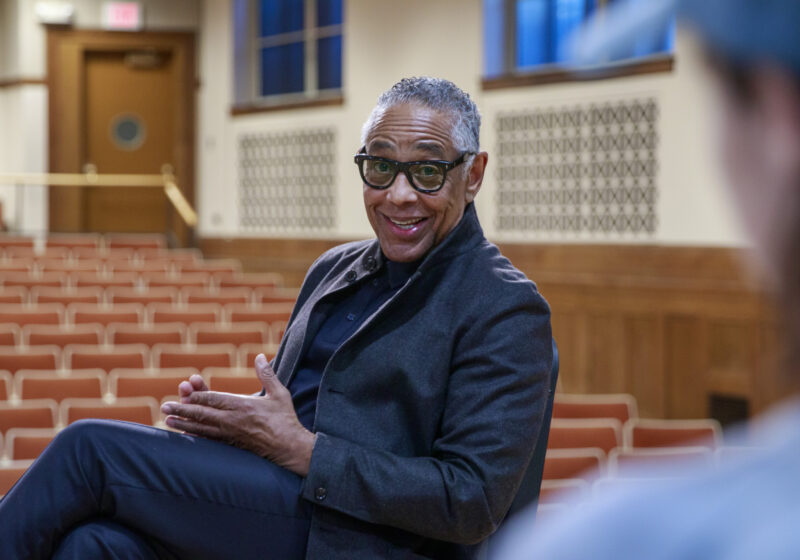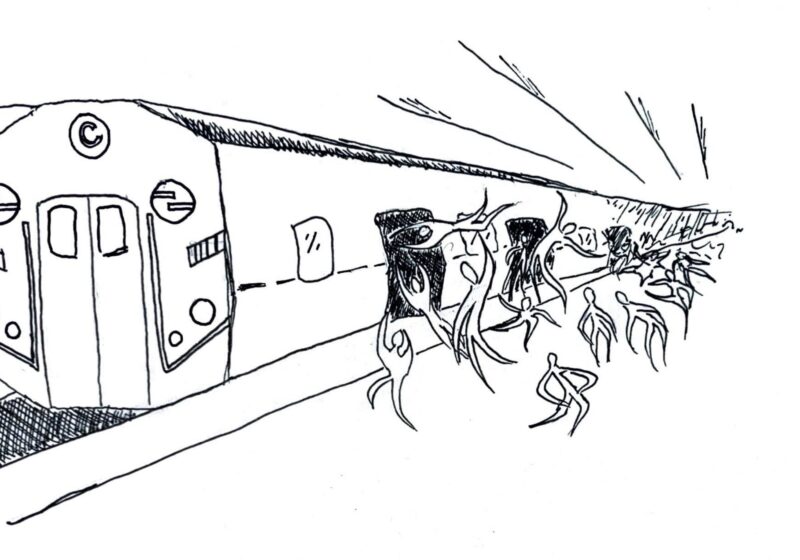This weekend, the University welcomed award-winning actor Giancarlo Esposito to Strong Auditorium as the speaker for the annual Martin Luther King Jr. Commemorative Address. As part of the introduction, Rochester Mayor Malik Evans presented a proclamation declaring Feb. 7 as Giancarlo Esposito Day.
Esposito, most well-known for his role as Gus Fring in television shows “Breaking Bad” and “Better Call Saul,” graciously partook in an interview with the Campus Times in collaboration with students from ENGL 131: Reporting and Writing the News.
Why did you want to give this speech and what do you want to get out of it?
I get a lot out of interacting with people who perceive my work and don’t know who I am. So in part and parcel it’s a way to get to know you, and for you to get to know me. ‘Cause I think highly of education. I went to a two year school, I struggled to get the education I wanted to get. I would have gone further. So I think education, for some, is a privilege; for others it’s a struggle and a challenge to be able to make it there. I value it highly, and so that’s why I’ve come.
What do you hope students take away from your message tonight? What will be the central focus of your message?
My message is that of empowerment, of personal empowerment. […] You grow faster if you’re faced with a challenge, and if you have desire, and if you commit yourself to what you believe you should be doing. […] It’s probably hard, as I would imagine being in your family of origin, and being steered by your parents to do what they think you should do. So it’s sometimes difficult to find out what you should do. And so my major message is do what you love to do.
Can you talk about the challenges you’ve faced in your career?
The challenges in the show business are directly connected to talent, age, geography, ethnicity, and so I’ve faced all of those challenges in what I do, because I came to this country at 5-year-old, basically as the product of a Black mother and Italian father. And so for the early part of my career I posed as whatever I needed to pose as to get a job. And I furthered that more when people assumed from my name […] that I was Spanish, and that clued me in to allowing myself to learn how to be Spanish at a time when there weren’t a lot of roles for African American young people. And so it allowed me to develop a craft in another ethnicity that I wasn’t.
So I learned to speak some Spanish and to use a Spanish accent and to have the idiom of someone who’s Spanish. […] For years it was a conventional casting system. So there was a role on paper for someone Caucasian between the ages of 20 and 40, that’s who they looked to cast. I was one of the people that started to break that mold by screaming loud at ‘em to say, “I deserve a shot at that role,” because really that role is colorless. […] I had many experiences that were painful, walking into a room of completely white actors.
In this one case, they assumed I was white from my name. That’s because they assumed I was Italian, and that means someone who’s olive skinned like my father, not white American. And they had to come up and say to me, “you know, we’re sorry, but we didn’t expect you…” I finished their sentence, “to be Black.”
So I faced all of those challenges, and then realized that all of those challenges were really the challenge of me surmounting how I thought about where I belonged in the business. […] You can let the world push you around and mold you, or you can mold yourself and then find a way to reinvent yourself within the world. And that’s a larger challenge of your own. […] You have to believe in yourself and be a self-starter to be able to have an idea that doesn’t relate to anything that you are ethnically. Like that doesn’t matter.
[…]
I was told many times, “you’re not gonna make it.” I was an actor off-Broadway, doing musical comedy […] I can still sing and dance, but that’s not what I wanted to do because I wanted to appeal to a larger audience. What is that larger audience? That larger audience is film and television. So I seek that out at a time where I wasn’t seeing many images of people who were reflected with dark skin or mulatto skin who were intelligent and smart. […]
Many roles that I took early in my career, I dumbed myself down, because that’s what I had to do. I played killers, and thugs, because that was the expectation, and that was the way for me to develop that skill to be able to play that. I was told by a manager who I really endorse, I won’t say any more, she said to me, ‘when you go in, don’t talk.’ Like just take the side and the scene, but don’t say anything. Like don’t introduce myself, don’t say hello, don’t be proper, don’t be a gentleman, don’t say anything. Because that’s your giveaway, you’re too smart, you’re too intelligent, and they don’t want someone as smart as you. So that was years of my life until then I decided that I would take a different route.
[…]
You’ve been open about your struggles with mental health. What advice would you give to someone who may be struggling with their mental health?
I’d probably first say get help. Slow down and get help. […] Mental health is really getting in touch with […] taking your own temperature, every single day. Like I’m a little depressed today, I don’t feel quite good, I’m gonna be funky, I’m gonna have an attitude. Let me try to fix that before I have any interaction with anybody. But that takes a lot of self awareness. So what I would suggest for mental health stuff is to get professional help, to help you to navigate and figure out what’s going on with you. […] Until you figure out what’s going on with you you can’t figure out what you wanna do with the rest of the world, right? Because that voice that’s speaking to you becomes the devil.
There are things you can do for that, I can tell you what I’ve done – I’m a meditator. That voice is always gonna be there until you shut it off. Your brain is like a computer, it’s never gonna turn off unless you shut it off. How do you shut it off? That’s the practice you need to learn. […] You go, whatever is gonna happen, it’s gonna be great. Simple mantra: I am, I will, I can. But because we’re human, we feel like we have all of the control. And we don’t. There’s circumstance, there’s life, there’s other people. We’re not alone in a little bubble. Shit is gonna happen.
What has been your favorite or most meaningful role or project that you’ve done in your career?
I just came here from shooting “The Boys” in Toronto, I feel blessed. […] I love the role I’m playing now. My favorite role is this role. Because this role has some kind of grounding in reality. […] I believe that people are in service. I believe we think we’re here to do it for ourselves, and become rich and be famous and all this other jazz. But really underneath it all it doesn’t matter. None of it matters. The only fulfilling thing in life that really matters is being in service to each other.
[…] ‘What are you coming to Rochester for, to share what?’ I hear that all over the country, and I always wanna go, ‘well, why wouldn’t I come to Rochester? What’s wrong with Rochester?’ […] You know what I’m saying? We put a spin on things that we bring to each other, and that makes you feel like you’re less than enough. Rochester is like Washington D.C.! It’s like New York! It’s like Toronto! It’s Rochester! Look how beautiful it is! Why wouldn’t I come here?







